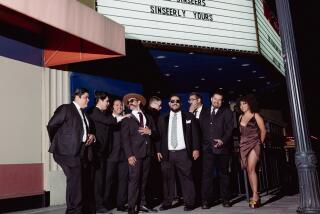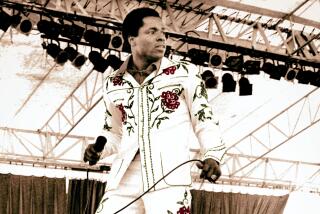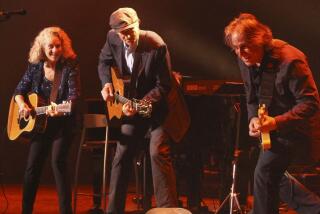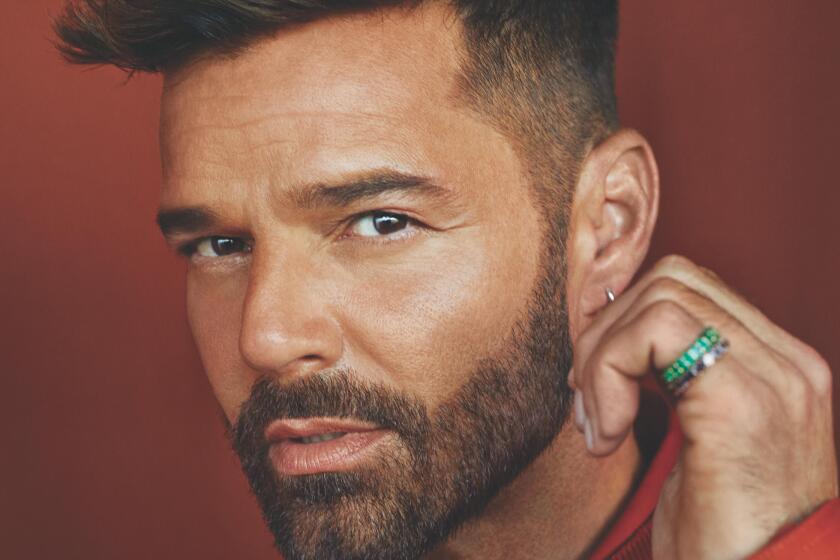With a new reissue, 1970’s Chicano rock band God’s Children brings Thee Midniters’ history back into focus
Those who study Southern California lowrider culture have likely cranked the East Los Angeles band Thee Midniters, whose garage-rock hit “Whittier Blvd.” has boomed from countless car stereos since its release in 1965.
Named for the 20-plus-mile thoroughfare that runs eastbound from downtown L.A. before ending in Brea, “Whittier Blvd.” helped soundtrack cruising culture and remains an anthem for four-wheeled peacocks.
The song is so embedded into the sound of East Los Angeles that it’s easy to forget that mortals wrote, played and recorded it — and that they remained vital musicians long after it was released.
For Thee Midniters anchor Willie Garcia — known since the 1960s as Willie G. — that song was merely the most successful in a 50-plus-year career that has featured a number of twists and turns. Until recently, one particularly hidden tributary was God’s Children, Garcia’s post-Midniters band, which he founded in the late 1960s with East Los Angeles singers “Little Ray” Jimenez and Lydia Verdugo (formerly Lydia Amescua).
The Chicano-rock unit’s early 1970s recordings were recently reissued as “Music is the Answer: The Complete Collection,” and they tunnel into a less traveled, but no less crucial, pathway in L.A. music history.
“I knew we were making magic — I knew that,” says Verdugo. “These two guys, Willie and Ray, were fantastic entertainers. And I could sing too. I knew I had something going on.”
Formed after Thee Midniters plateaued as a band, God’s Children was born out of Garcia’s alienation with the music business. Post-Midniters, he had taken leave of the Hollywood music scene to work the solo circuit at folk-leaning clubs the Ash Groove and Troubadour. Instead of singing party songs about driving, though, Garcia had been revved by the Chicano rights movement.
His goal, he said during a recent conversation at his wife’s real estate office in — where else? — Whittier: To build a platform to experiment with songs about what he called “the Chicano movement and music of the times — things that were evolving in my own heart and spirit.”
But Garcia was missing the energy of communal creation and wanted to get away from the increasingly grungy vibes of the L.A. rock scene. So he reconnected with former Midniter and Chicano soul singer Jimenez, who was collaborating with Verdugo at the time, and picked up a few other members at a club called the Wagon Wheel in Oxnard.
Verdugo — who still sings professionally as Two’s Company with her ex-husband Steve Verdugo — was well aware of Thee Midniters’ success. As a teen, she used used to see Garcia cruising Whittier in a variety of fancy cars. She recalls thinking, “How many cars does this guy have?”
They desired to play music while avoiding what Garcia called “the star stuff” in the club scene. “We needed to play live, and we needed a place to rehearse and not have to move around a lot,” Garcia says.
They found the spot 100 miles north of Hollywood at a place called the Caravan Inn in Bakersfield, where for the next year the band that became God’s Children lived and played daily at the resort, rolling through dance music at night and hanging by the pool during the day.
God’s Children eventually expanded to a nine-piece, and the daily performances built an act that combined rock, folk and country music in a way that drew a cross-section of fans.
“We cultivated an audience at this spot. It wasn’t unusual for Merle Haggard to come in on a Wednesday night and sit over in his favorite corner of the joint and drink Jack and Coke,” Garcia says, adding that at the time, Buck Owens had his club down the street too.
Haggard got on stage a few times with the band to play. “He said he was learning to play fiddle — although he could really play,” Garcia said. The band even learned a song Haggard had recorded, “Who Will Buy the Wine,” so that he could join in on something he knew.
The next year, God’s Children moved to another hotel, the Holiday House, in a more rural part of Bakersfield, after the owner offered them more money — and all-new equipment.
Garcia and Jimenez, however, missed the city, and in mid-’71 they were approached by Victor Franco at the Mechicano Arts Center in East L.A. Wanting to represent the Chicano movement at the Palladium, he asked God’s Children to perform on a bill with Latin rock band El Chicano and the Gerald Wilson Orchestra, whose “Viva Tirado” El Chicano had made into a hit.
So Garcia, Jimenez, Verdugo and the band returned to showcase what they’d accomplished in Bakersfield.
“I remember looking out and seeing a sea of people,” Verdugo says of that show. “And I remember thinking, ‘I like being a singer — this is great!’ I wasn’t making any money, but I knew I was headed in the right direction.”
Adds Garcia: “It was just extraordinary. The response we got from Southern California audiences who remembered Little Ray and remembered me was, ‘So there they are!’” (Jimenez declined to be interviewed for this story.)
At the Palladium, the band was “bit by the Southern California music scene again,” Garcia adds, but Jimenez was wary of returning to the bustle. In hindsight, he was right, says Garcia. “We started getting pulled in different directions.”
That show was the siren’s call for Garcia and the band and the catalyst for a renewed run at commercial success. Both Thee Midniters and Little Ray had been huge local acts, but, Garcia says, “a lot of people didn’t know what we were doing because we were hidden over there in a cave in Bakersfield.”
Regardless, a few months later, they were recording their debut album a few blocks down Sunset at Columbia Studios. The product of those sessions became “Music is the Answer: The Complete Collection.” Consisting of fourteen tracks that the band recorded for Gordo Records — including a number with famed Wrecking Crew studio musicians including Leon Russell, Hal Blaine and Carole Kaye — the recordings reveal three vocalists at peak power.
“It Don’t Make No Difference” is a propellant call-to-action that recalls Sly & the Family Stone’s protest anthems. “Hey Does Somebody Care” teams Garcia and Jimenez in a kind of vocal duel as they swap lines and verses. For their take on “Put Your Head on My Shoulder,” Garcia and Verdugo harmonize as an urgent rhythm section moves with expertly practiced momentum.
Across the songs, the skill and natural talent is obvious. Behind the scenes, though, the situation was deteriorating. Garcia said he became addicted to heroin during the period. For her part, Verdugo said she was occupied raising her son with Garcia.
Great expectations also hobbled them. “I think everybody was so talented that our egos collided,” Verdugo says. “I knew it was special as we were up there on stage. ‘We’re dynamite! This is a dynamite band! I hope we go far.”
Pausing, she adds: “We didn’t go far.”
For tips, records, snapshots and stories on Los Angeles music culture, follow Randall Roberts on Twitter and Instagram: @liledit. Email: randall.roberts@latimes.com.
More to Read
The biggest entertainment stories
Get our big stories about Hollywood, film, television, music, arts, culture and more right in your inbox as soon as they publish.
You may occasionally receive promotional content from the Los Angeles Times.







